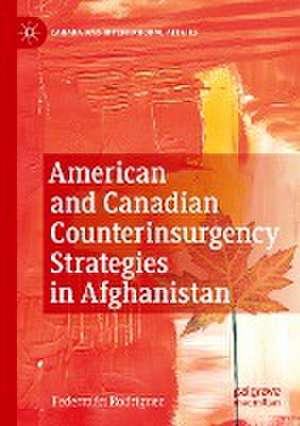American and Canadian Counterinsurgency Strategies in Afghanistan: Canada and International Affairs
Autor Federmán Rodríguezen Limba Engleză Paperback – 2 noi 2023
| Toate formatele și edițiile | Preț | Express |
|---|---|---|
| Paperback (1) | 777.50 lei 6-8 săpt. | |
| Springer International Publishing – 2 noi 2023 | 777.50 lei 6-8 săpt. | |
| Hardback (1) | 782.57 lei 6-8 săpt. | |
| Springer International Publishing – noi 2022 | 782.57 lei 6-8 săpt. |
Din seria Canada and International Affairs
-
 Preț: 291.17 lei
Preț: 291.17 lei -
 Preț: 224.32 lei
Preț: 224.32 lei -
 Preț: 400.21 lei
Preț: 400.21 lei -
 Preț: 360.19 lei
Preț: 360.19 lei - 15%
 Preț: 646.94 lei
Preț: 646.94 lei -
 Preț: 386.00 lei
Preț: 386.00 lei -
 Preț: 459.38 lei
Preț: 459.38 lei - 18%
 Preț: 1240.16 lei
Preț: 1240.16 lei -
 Preț: 454.92 lei
Preț: 454.92 lei - 18%
 Preț: 888.31 lei
Preț: 888.31 lei -
 Preț: 486.60 lei
Preț: 486.60 lei - 18%
 Preț: 892.74 lei
Preț: 892.74 lei - 18%
 Preț: 723.38 lei
Preț: 723.38 lei - 18%
 Preț: 783.05 lei
Preț: 783.05 lei -
 Preț: 419.59 lei
Preț: 419.59 lei - 18%
 Preț: 724.63 lei
Preț: 724.63 lei -
 Preț: 318.29 lei
Preț: 318.29 lei
Preț: 777.50 lei
Preț vechi: 948.18 lei
-18% Nou
Puncte Express: 1166
Preț estimativ în valută:
148.78€ • 159.09$ • 124.05£
148.78€ • 159.09$ • 124.05£
Carte tipărită la comandă
Livrare economică 18 aprilie-02 mai
Preluare comenzi: 021 569.72.76
Specificații
ISBN-13: 9783031182815
ISBN-10: 3031182812
Ilustrații: XVII, 238 p. 6 illus., 5 illus. in color.
Dimensiuni: 148 x 210 mm
Greutate: 0.31 kg
Ediția:1st ed. 2023
Editura: Springer International Publishing
Colecția Palgrave Macmillan
Seria Canada and International Affairs
Locul publicării:Cham, Switzerland
ISBN-10: 3031182812
Ilustrații: XVII, 238 p. 6 illus., 5 illus. in color.
Dimensiuni: 148 x 210 mm
Greutate: 0.31 kg
Ediția:1st ed. 2023
Editura: Springer International Publishing
Colecția Palgrave Macmillan
Seria Canada and International Affairs
Locul publicării:Cham, Switzerland
Cuprins
1. Introduction.- 2. Countries with Different Material Capabilities Behaving Similarly.- 3. Unipolarity and Irregular Warfare: Assessing the Afghanistan Intervention’s Strategic Environment.- 4. American and Canadian Security Beliefs: Transitioning to Similar Foreign and Security Policies during the Afghanistan Intervention.- 5. Domestic Hurdles, Canadian and American Foreign Policy Executives(FPEs)’ Structural Autonomy and Resource-Extraction Capability.- 6. Conclusion: Unravelling the Research Puzzle.
Notă biografică
Federman Rodriguez is Assistant Professor of the Faculty of International Relations, Political and Urban Studies at Rosario University, Bogotá, Colombia.
Textul de pe ultima copertă
“Federman Rodriguez sets out to resolve an intriguing puzzle: How did two countries with so great a disparity of national power, Canada and the United States, come to adopt similar military policies in Afghanistan in 2006-2011? International Relations theory and historical precedent would have predicted otherwise. Rodriguez’s highly readable volume provides a compelling explanation of Canadian and US foreign policy and sheds light on the opportunities and limitations of power in the international system.”
--Elinor Sloan, Carleton University, Canada.
“Federman Rodriguez adapts the theory of neoclassical realism to explain, despite vastly different capabilities, how Canada and the United States’ foreign and security policy in Afghanistan converged on a counterinsurgency campaign. He provides a theoretically unique and empirically rich analysis of the decisions made by each country. This book is important in understanding what happened to the ill-fated intervention in Afghanistan.”
--Brian C. Schmidt, Carleton University, Canada. The book aims to explain the factors that brought about a high degree of similarity between American and Canadian foreign and security policies during the Afghanistan intervention. Specifically, it seeks to explain why, despite their different positions in the international distribution of power, the United States and Canada embraced similar counterinsurgency (COIN) strategies from 2005/2006 to 2011. During this time, the United States and Canada fought against insurgent groups, sought to maintain stabilized areas by mentoring Afghan forces, and invested in infrastructure and governance. These goals, which corresponded to the ‘clear,’ ‘hold,’ and ‘build’ COIN components, entailed sending troops and civilian officials to a war zone and committing financial resources.
Federman Rodriguez is Assistant Professor of the Faculty of International Relations, Political and Urban Studies at Rosario University, Bogotá, Colombia.
“Federman Rodriguez adapts the theory of neoclassical realism to explain, despite vastly different capabilities, how Canada and the United States’ foreign and security policy in Afghanistan converged on a counterinsurgency campaign. He provides a theoretically unique and empirically rich analysis of the decisions made by each country. This book is important in understanding what happened to the ill-fated intervention in Afghanistan.”
--Brian C. Schmidt, Carleton University, Canada. The book aims to explain the factors that brought about a high degree of similarity between American and Canadian foreign and security policies during the Afghanistan intervention. Specifically, it seeks to explain why, despite their different positions in the international distribution of power, the United States and Canada embraced similar counterinsurgency (COIN) strategies from 2005/2006 to 2011. During this time, the United States and Canada fought against insurgent groups, sought to maintain stabilized areas by mentoring Afghan forces, and invested in infrastructure and governance. These goals, which corresponded to the ‘clear,’ ‘hold,’ and ‘build’ COIN components, entailed sending troops and civilian officials to a war zone and committing financial resources.
Federman Rodriguez is Assistant Professor of the Faculty of International Relations, Political and Urban Studies at Rosario University, Bogotá, Colombia.
Caracteristici
Examines a critical case of Canadian foreign and security policy in Afghanistan Challenges the bandwagon-effect, military-ascendency and compensation theses Explains why and how states differently placed in the international system end up behaving similarly
